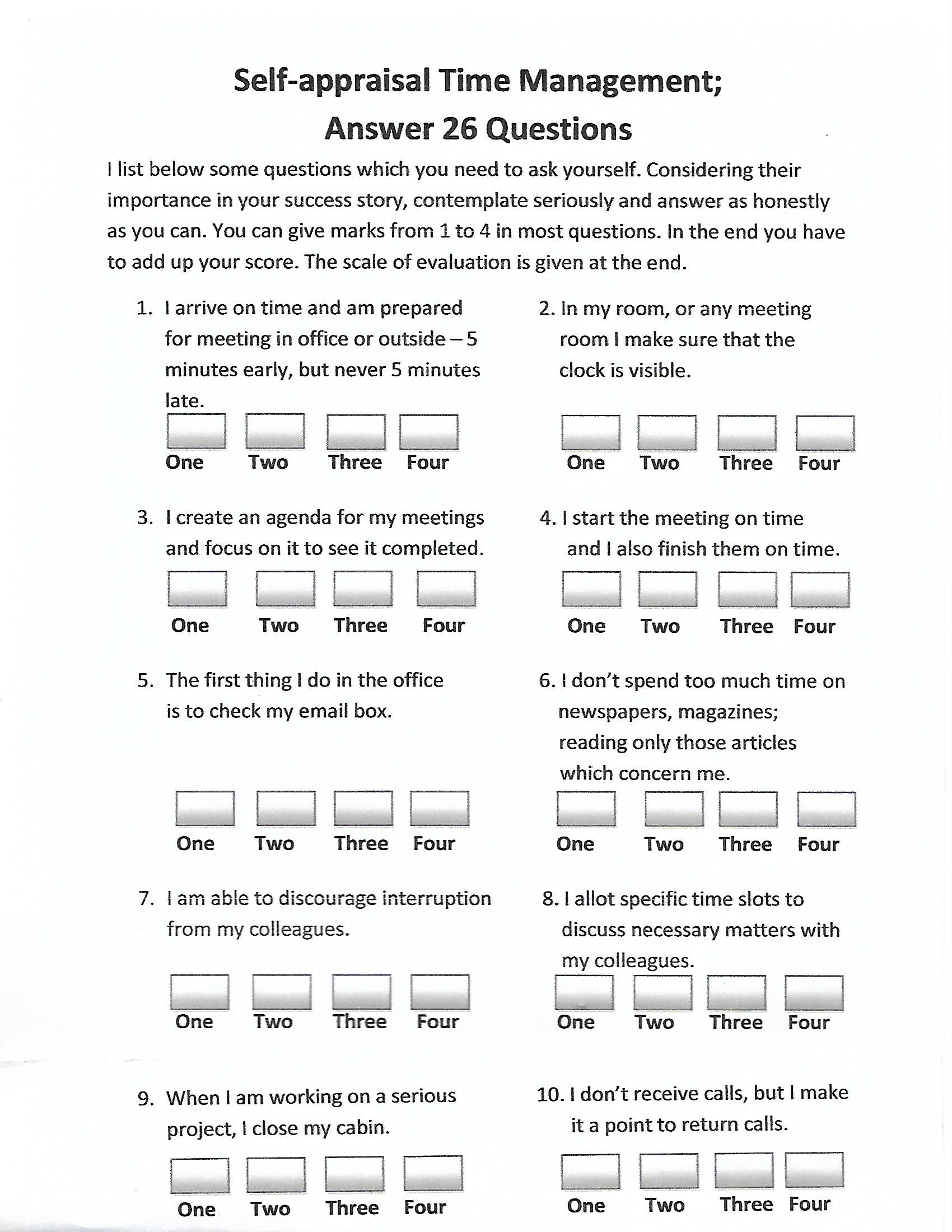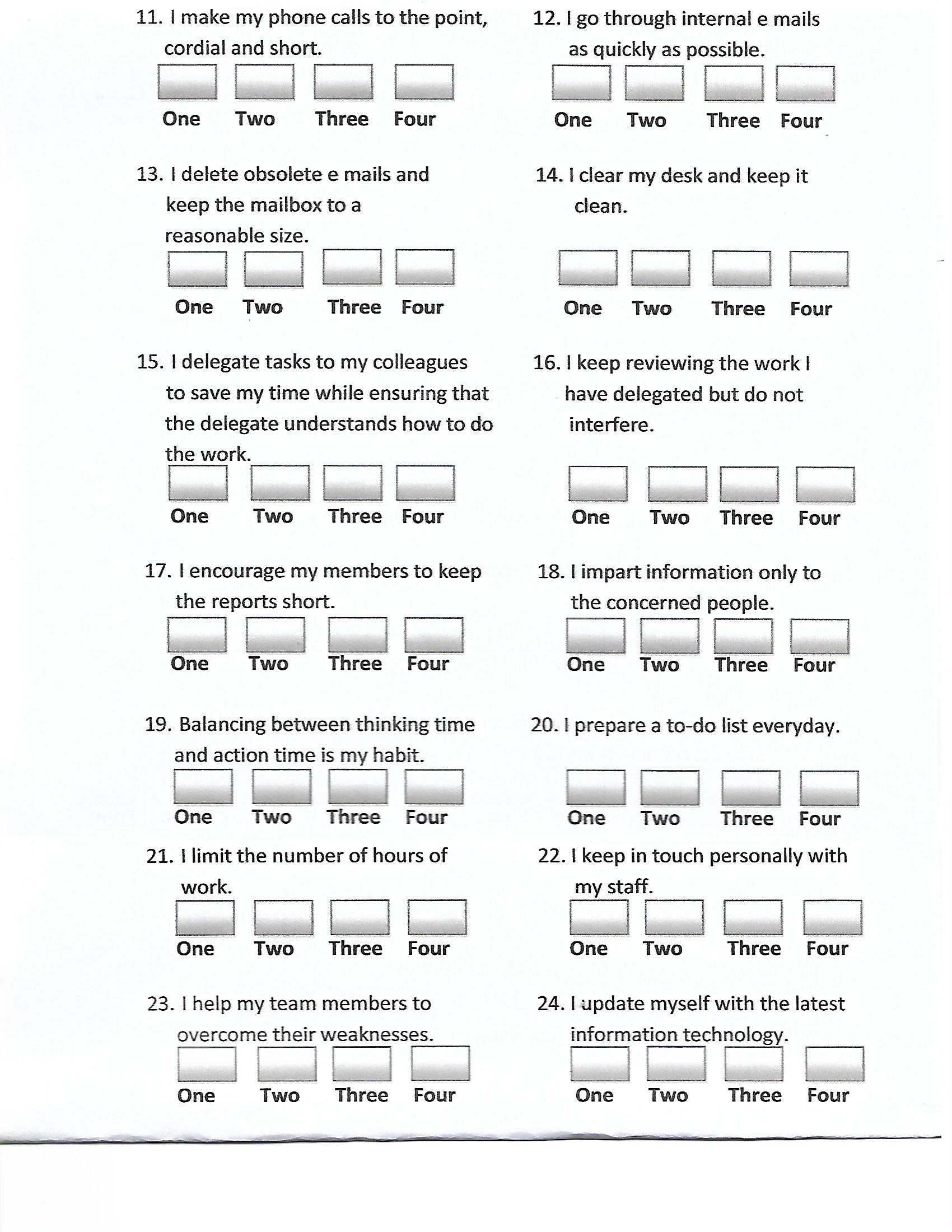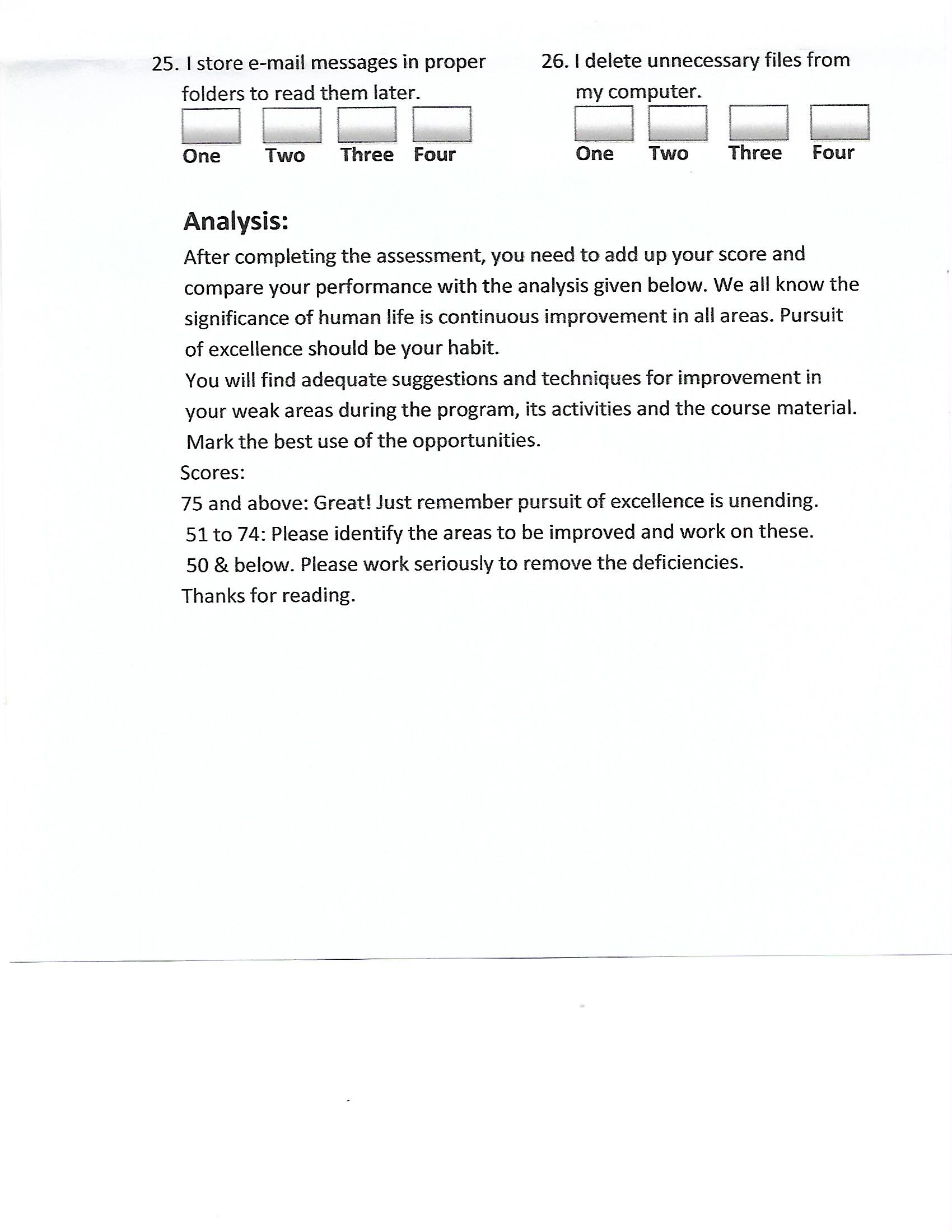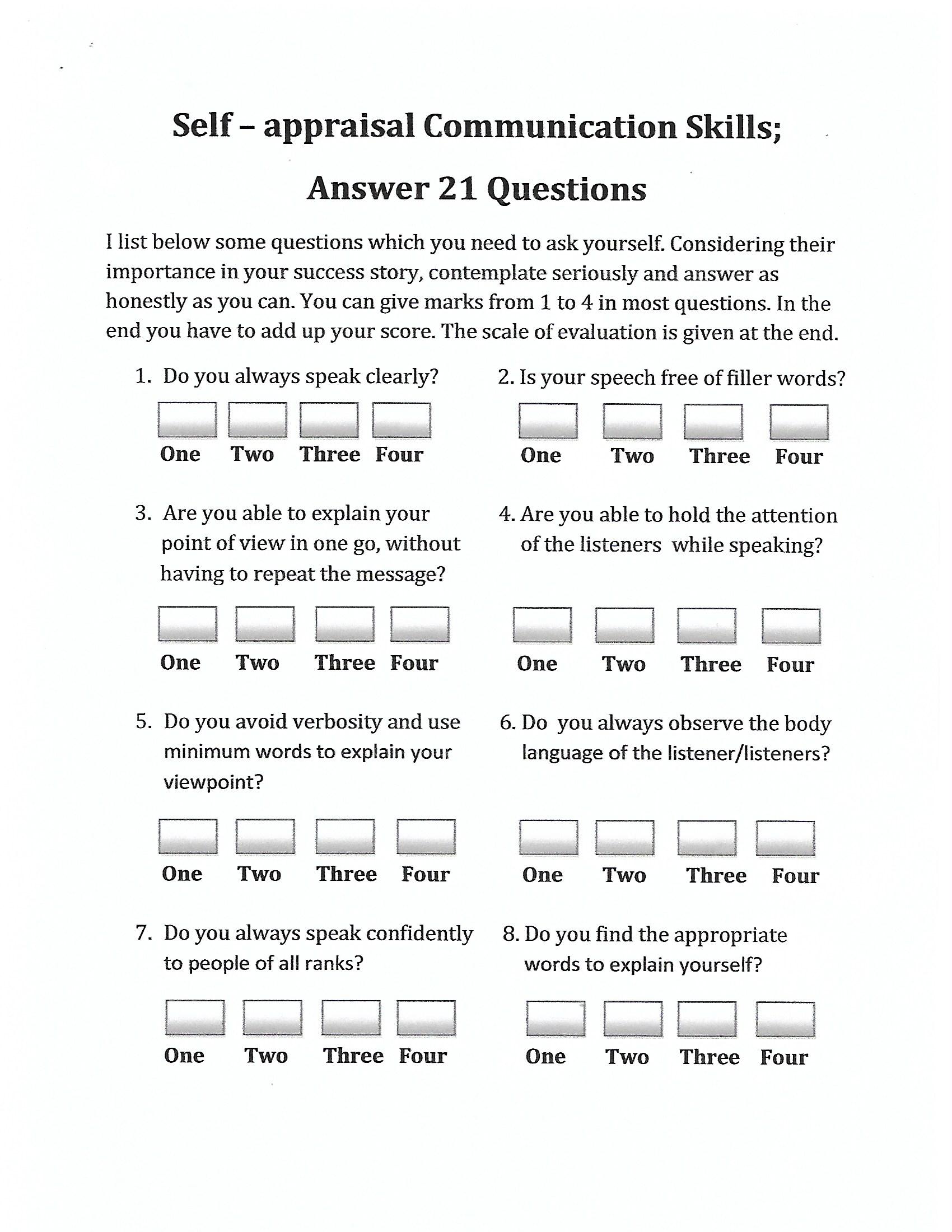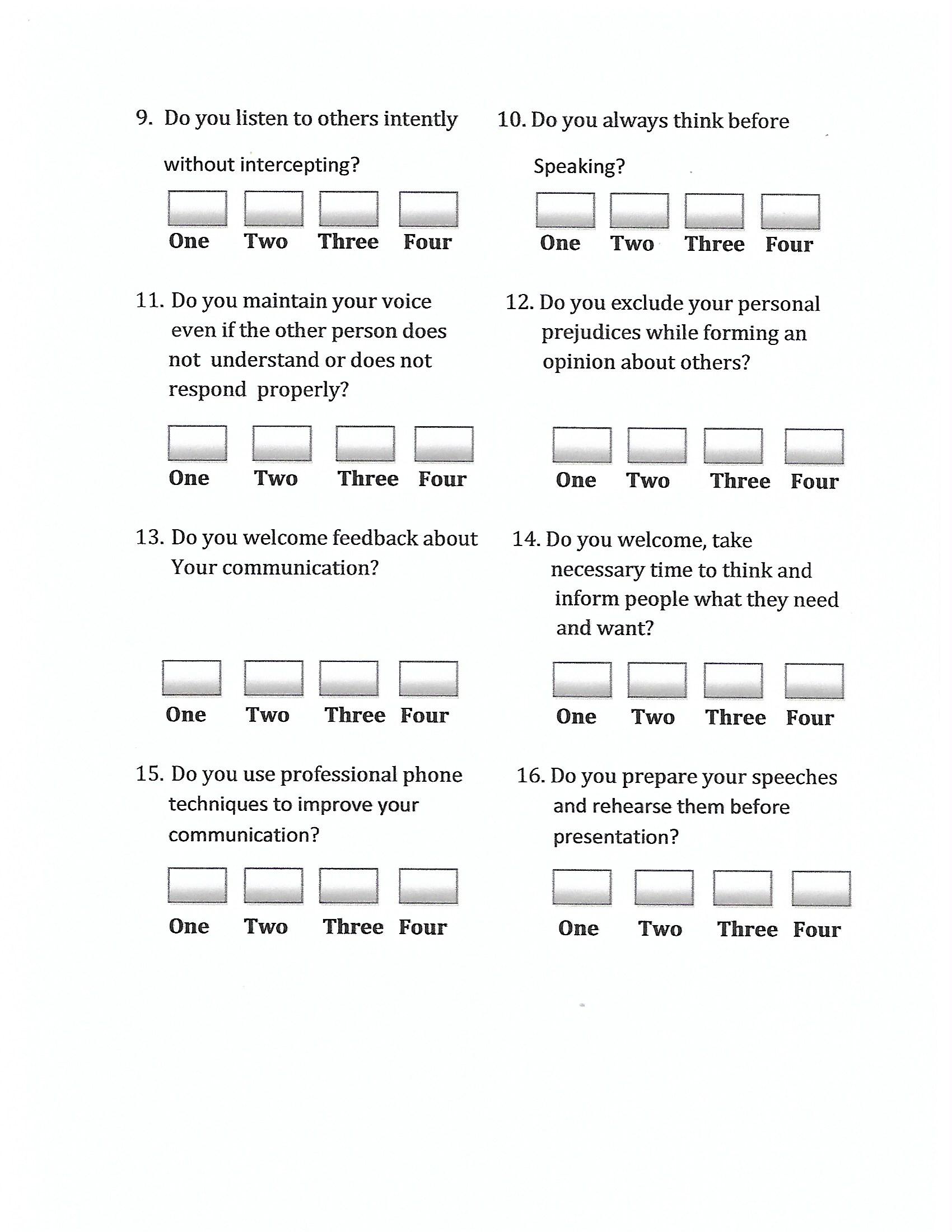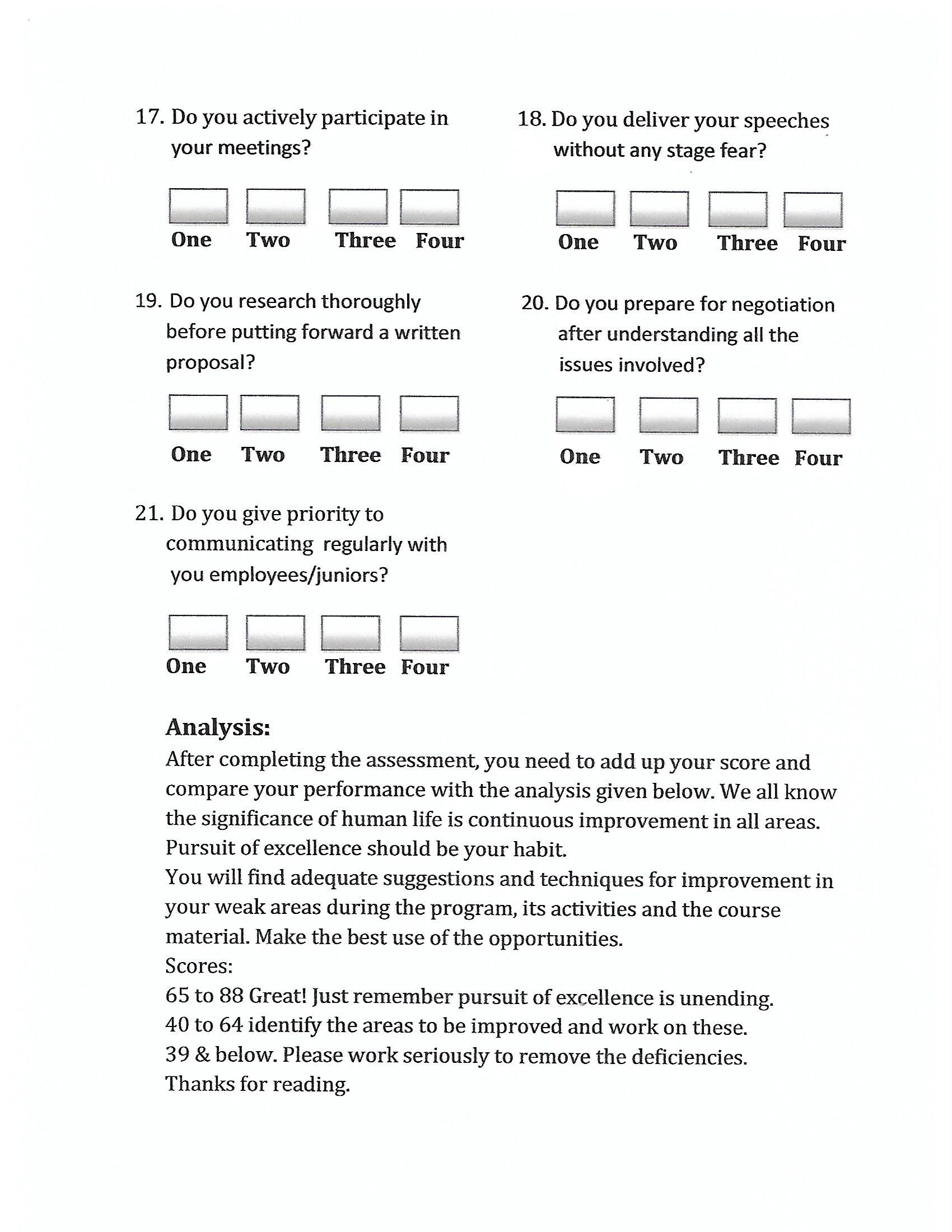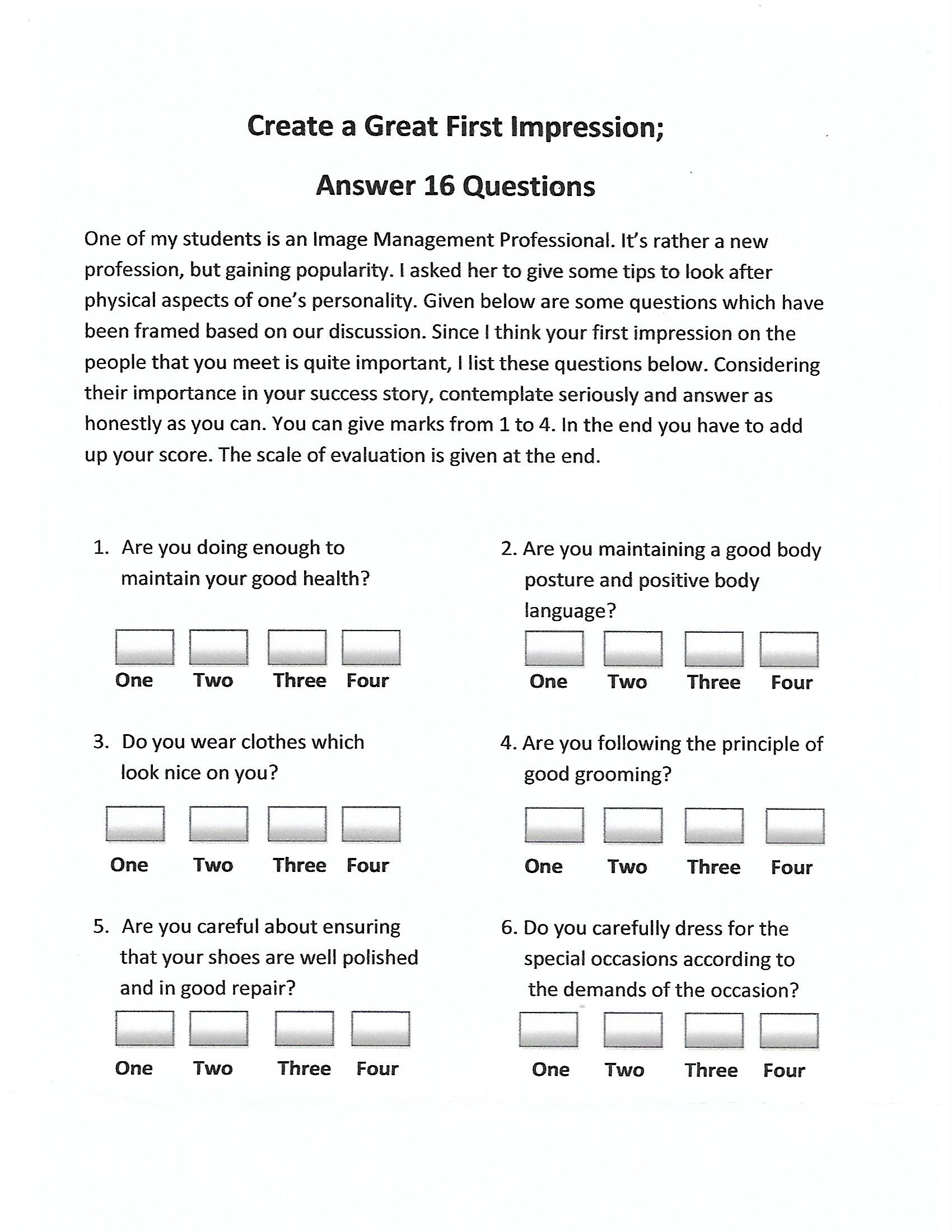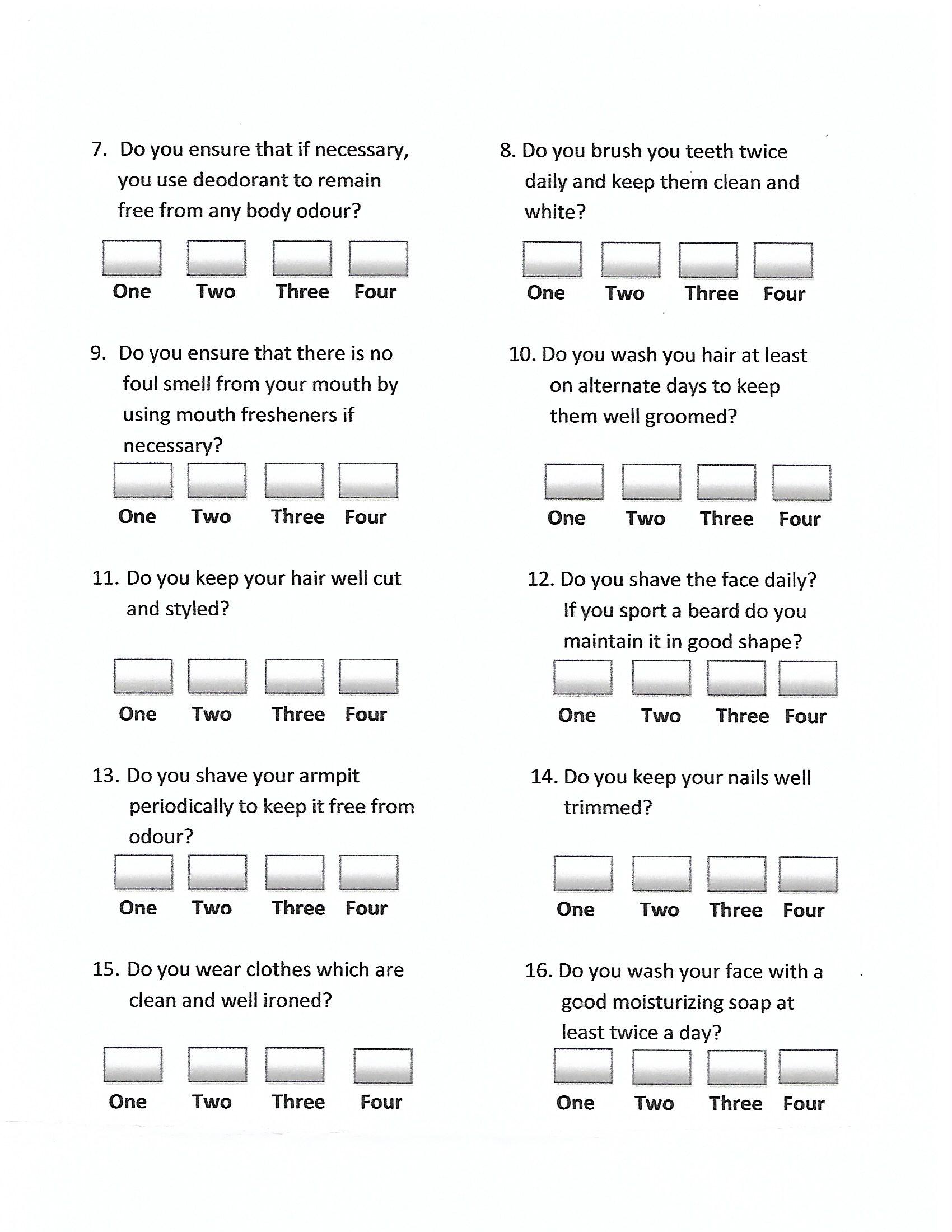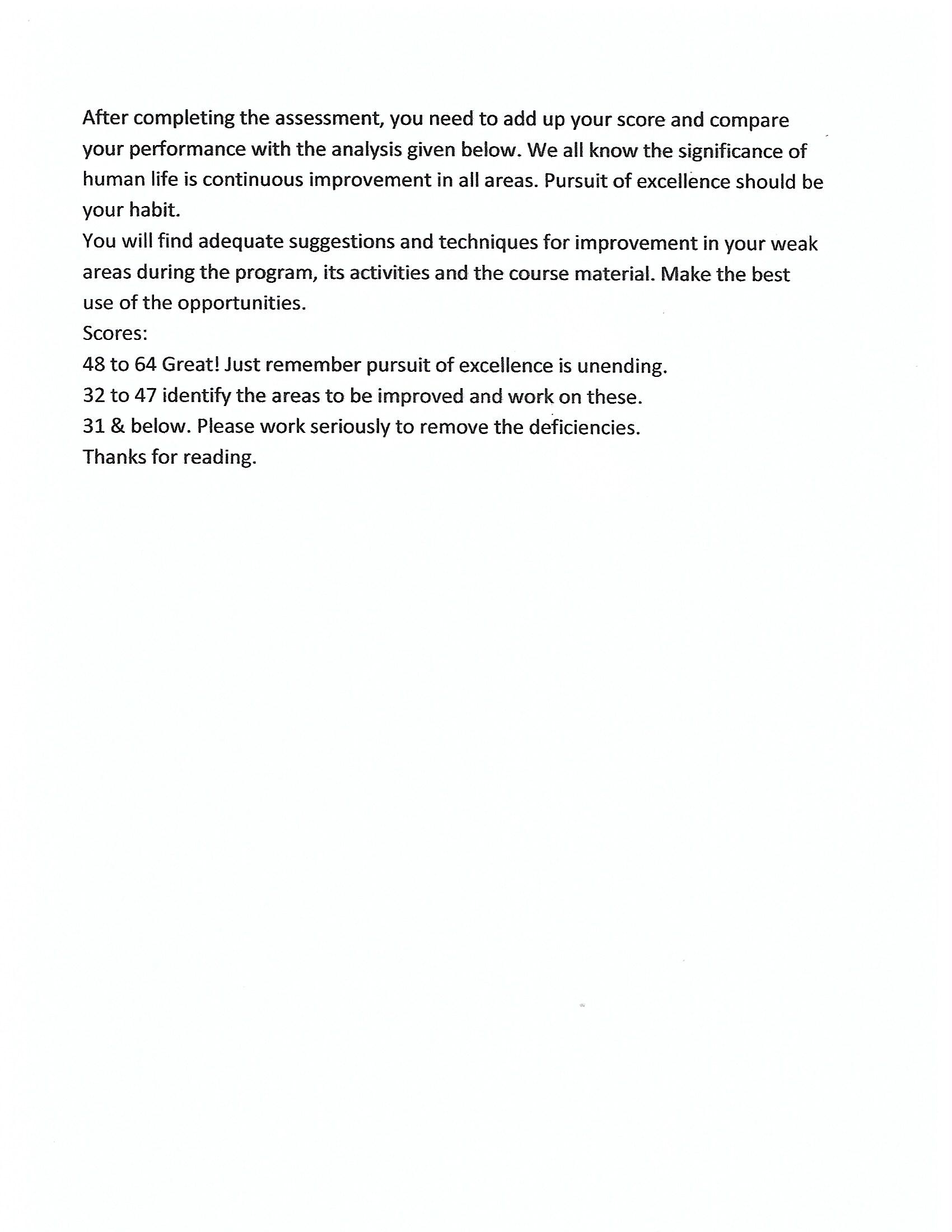Self appraisal Communication Skills; Answer 21 Questions
Bad News: Time Flies Away / Good News: You are the Pilot
If there is one thing that is equally distributed by the Lord Almighty, that is Time. And it is the most important of all resources. Proper use of time makes the people very successful and vice-versa. With the fast development of technology, executives are expected to be far more productive. It is possible. But it calls for more efficient use of your time.
In fact, over the years our attitude towards time has changed. Today, each one of us has become aware of cost of time.
One can effectively use time if the goals are written down. The specific goals make it mandatory to write down a plan of action. And when you have worked out your plan to achieve your goals in respect of important aspects of life, there is hardly any time which you can afford to lose.
I would like to mention here that some habits need to be changed to be more time productive. These are:
- Procrastination is the most potent culprit which destroys some of your most precious time. It is only important tasks that you want to carry out as a priority. But if the task is challenging, many a time you tend to postpone it. In the process, you lose time but more importantly the burden or guilt of not attending to important work makes you time inefficient. So having a habit of procrastination even in the smallest measure is not permissible.
- Time has the habit of expanding to work to the time allotted. Even if you are able to do a job in two hours, but you have four hours available, the work will expand to fill all four hours. So what is the remedy? Allot lesser time to the task. You may have to stretch yourself a bit. Do it. But, save time.
- Another villain which steals away your time is indecision. Whenever you are not able to decide between two or more options, you lose time. You must learn to be more decisive. Normally decisions are not taken because of risks associated with the decision. We must remember that not taking any risk is the biggest risk of our life.
- Verbosity in our speech is another time-wasting demon. We need to be terse in our communication. It just requires better focus and a determination of not using more words than are necessary.
- If we follow the system of diving our tasks into four quadrants as propounded by Steven Covey of “Seven Habit of Successful People”, we can surely save time which is often wasted.
There are some suggestions to use our time more productively. These are:
- Keep a Time Log for 2-3 days. Understand the normal, routine use of your time. Now study the same to find out where you can save time. The exercise will not go waste. In process the credit balance of your time current account will increase.
- If you want to become really time efficient follow the rule of 60 : 25 : 15.You must try to complete your routine (daily tasks) in 15% of the available time. Besides, 25% time should be spent on ongoing projects. Finally, spend 60% of your time on developments, innovations, and new projects.
- Make a to-do every day morning and try to complete the jobs which must be done on that day. In this list, you must keep in mind the priorities. In fact proper prioritizing your tasks enables you to use your time very productively.
Working out priorities:
You must analyze your tasks. Then place them in three distinct categories:
- Tasks which are important as urgent. These cannot be carried forward.
- Tasks which are important but not urgent. For example, looking after your health and going for a walk daily is important but not urgent.
- Tasks which are neither urgent nor important. These should always receive the least importance.
While making your to-do list you must be realistic. Don’t pack too many things in a day which cannot be completed. If is unnecessary to create a burden for yourself. This will decrease your efficiency.
Thanks for reading.
Create a Great First Impression; Answer 16 Questions
12 Questions for Self Assessment in respect of your Attitude:
Pretending: Good, Bad & Ugly

Everyone at some point must have come across pretending. What’s pretending?? Pretending is behaving to be who we want people to think we are. While pretending, we hide our original personality and stage the artificial person in front of people to please or impress them. Below are the facts on pretending which can help you know more about the dos and don’ts of pretending.
Actions speak
Actions express somebody’s personality. Yes, it’s true and words often show who the person pretends to be. Don’t believe in somebody’s words, try to analyze and see through their actions because actions and conduct tell the truth which words don’t. Therefore, if you want to find out if someone is pretending read their actions closely and carefully that will show if the person is for real or reel.
Pretending can be Good. It can be Bad. But it can also be Ugly. Let’s examine some situations to know about it.
Good
Pretending isn’t all about negativity
Pretending doesn’t always possess negativity it also owns certain positive aspects. For example, pretending to be happy when you’re in pain is just an example of how strong you’re as a person. There’s also a moral from this example. Never show your pain because not many people will share your pain, instead they will celebrate for your pain.
Smile instead of sympathizing
Sometimes the best solution is to smile and move on with your day. That sympathizing feeling on your face isn’t going to help you. Hold back your tears and pretend that everything is well and good because others will feel happy seeing you smiling and cheerful and there may be opposite reactions to be ready for it.
Bad
Accept your mistakes
One of the biggest flaws committed by many is pretending to be blind to their own mistakes. Never ignore your mistakes at the same time never try to overlook your mistakes too. Stop pretending like you’re an angel everybody commit mistakes and therefore never underestimate your capabilities just because you have committed a mistake. On the other side don’t pretend to be deaf towards others mistakes because that will lead you into greater losses.
Don’t lose your real personality
Be careful who you pretend to be because in the process of pretending you might lose your own identity. It’s never ever good to forget who you are and isn’t appreciable too. Always recollect where you are, what you are because only these things will boost your self-awareness which would take you places. If you pretend to be somebody else and not yourself, finally it’s going to take you nowhere.
Don’t accept things as they appear
Many people pretend to like you. At times even you might have joined the crowd for a good cause or for a bad cause. As people pretend to like you, all of a sudden you will start pouring out all your joy and care for those people who aren’t worthy of. Actually, doing so shows your foolishness because such kind of people doesn’t deserve your care and concern.
Ugly
Here are some situations when pretending turns ugly. There could be many more.
- A vehicle has hit someone who is bleeding on the good, you pan by pretending you have not
- A woman is being beaten by a man, you see if and pretend you haven’t and more on.
- A friend who is serious needs financial help from you, but you pretend you do not have money.
Some suggestions
- Express your originality : Stop pretending for a while and express how you really feel towards someone. It can be a positive or a negative feeling but express it with utmost honesty. However, after the revelation observe how the relationship continues to sail.
- Avoid pretending unless when ‘Good’ : Live without pretending, love without depending, listen without defending, and speak without offending. There’s lots of wisdom in this quote. Live your own life with joy, don’t pretend or fake yourself to impress others. Love without any expectation, listen with peace, understand and then analyze. Use your tongue with caution because that’s the most dangerous weapon in the world that can pierce and hurt a person more than a bullet. Hence, stop offending others with your words.
- Live your life : Finally, live yourself and set your own identity. Yes, you need that skill to find out people who are pretending to be your beloveds but getting them erased of your life wouldn’t make a greater difference. Instead invest your time in finding the real people who understand and are really impressed with your originality. Pretending isn’t an issue when not practiced always!!
- Never carry forward situations : Life is a handful of short stories pretending to be a novel. Yes, all situations are detached. When the situation takes place the matter comes to an end, it isn’t supposed to be carried forward and never get stuck to the situation. If it had left a lesson behind take the lesson and move forward.
Thanks for reading. Your comments will be highly appreciated.
Why Settle for ‘Less’ when you can ‘Achieve’ More?

Situation 1:-
An “X “employee gets the promotion while a “Y” employee doesn’t!
Situation 2:-
“ABC” salesman could reach the given target in the particular time while the other “KYC” couldn’t and hence is fired from the organization.
Clearly, the difference between the two is their ‘Effectiveness’!
In today’s competitive world, the word “Personal Effectiveness” has got an immense importance, and why not? Today’s work environment is very demanding and to be successful means grooming yourself and honing with the skill of being effective. Personal effectiveness is not restricted to the corporate environment. Productivity is important and can be applied well to all other walks of life. May be also the be kitchen work , gym work out or anything else carried out by you.
What is this technique and how to imbibe it?
Well, let us discuss in detail what is personal effectiveness after all?
Peter Drucker quotes:-
“Efficiency is doing things right, Effectiveness is doing the right things”.
Self explanatory as it is personal effectiveness of a person can be calculated by two parameters. It not only measures the result against time but also gauges the quality of work. Quality and quantity, both are important. Thus, effective people are those who can achieve more quality work in less time. While doing so they are not stressed, or confused as if they are working under pressure. Neither do they lose their physical health nor do they lose their mental or emotional one. These people are consistent and deliver results constantly.
Andre Maurois says ”The effectiveness of work increases according to geometric Progression, if there are no interruptions”.
So let us take a look at how do you achieve personal effectiveness. Personal effectiveness is the art which helps in self development. You need to observe and practice the seven important rules to achieve the same.
Rule 1:-
Thoroughly understand what you want to do
When you start doing a certain work do start in haste .” Well begun is half done”- Isn’t it? And that is why it is required to thoroughly understand the task which you are supposed to begin. Read through or just mind walk through the process. You may encounter some grey areas which can be dealt with by exploring more from the umpteen books and also the internet. Information can be extracted from various sources if not available readily! Isn’t this process more sensible than starting the project in a hurry and then stumbling across something which you are clueless about? This is one of the principles to work your way straight to personal effectiveness. It reduces the time in which the work is done and also improves the quality of the work.
Rule 2:-
Focus on your work.
It is easier said than done! But you need to starve all the distractions that come in your way and you need to feed your focus. The art lies in not digressing from the objective in any way. Focus means to continuously put your attention on something and forget the rest of the world. When handling something of critical importance, lock yourself in where no one can disturb you. Once you start on focusing on what you want to achieve, every other stuff should appear meaningless. Focus empowers and teaches you a lot. If you love your job, this love will add to your focus. One has to decide to be focused until it becomes a habit. And eventually the end result is qualitative work in less time.
Rule 3:
Self belief
Undeterred faith in youself is a sure way to personal effectiveness. Unless you believe in yourself how can you make the world believe you. Doubtful mindset spoils the results. You should have a constant strong belief in yourself and your capabilities. Best possible results often are delivered when you keep reinforcing that YOU CAN DO IT !
Rule 4:
Expect the unexpected
Life is never a straight line. Everyone has their own ups and downs. All of us have roughs and crests. But the art to lead personally effective life is to be least disrupted due to unexpected events. You can have a plan. But rarely do plans get executed in the same way as planned. You should be proactive enough to foresee any interrupting event and should have an alternative plan which would work without any hassles. Personally effective people are prepared to handle any situation with great ease.
Rule 5:-
Application of mind which is always necessary.
Mind is the biggest weapon. Human beings are armed with it and must use it for improving on the battle of being competitive. Many great feats are best performed when mind is applied to those. Never take for granted even small objectives. Once you apply mind to a particular problem, you will definitely find a solution. The more you apply your mind to something that you love it becomes more effective .
Rule 6:-
Put your mind and soul into the work
When you dedicate totally and put your mind and soul into an objective, you start enjoying the work. When you do the same you leverage on opportunities .The lessons learnt through various experiences in life could also be put to use to be personally effective.
Rule 7:-
Stretch yourself a bit
Nothing worthwhile can be achieved by shortcuts. You should be eager to move an extra mile Then only better things can happen.
It is often said that “ if you wish to achieve something you haven’t you need to do something you have not!” That is where you can get different results by putting yourself to a task little more than yesterday. Your objective should not be competing with others, but improving your own self . Continuously improving the work that you do and following the other 6 rules is the way to sure ‘personal effectiveness’
Thanks for reading. Wishing you all the best in the New Year.
Your comments are welcome and will be highly appreciated!
Thanks for reading.
Ignoring as an alternative to Brawl!

Many a times we face situations when we are being ignored by people for whom we care. Likewise, it may happen the other way round. Let’s look at the various possibilities of you ignoring someone or being ignored. There could be many possibilities and different situations. Sometimes, it is not bad, while most of the times ignoring or being ignored badly hurts. In any case, it’s necessary not to ignore such situations. We must contemplate, analyze and then take necessary action. Some of the circumstances are as below:
- You ignore someone – Reason?
- Someone ignores you – Reason?
- When ignoring is the best way to handle problematic situation?
- Problems between husband and wife.
- Bullies it the work place or in society.
- Silence can be a person’s loudest cry. You know you have really hurt someone when they start ignoring you. It is worse than saying anything bad to you and is even worse than rebuking you. In other words, the feeling of being ignored is extremely disturbing.
- When you are ignoring someone continuously, you are teaching him/her to live without you which is bad as you are creating a gap between yourself and the person whom you are ignoring, this may never be filled.
- If anybody is ignored, it is very difficult for him/her to compromise with that idea. They will always wish that they could ignore the fact that they are being ignored.
- A person may get a feeling of rather being said that they don’t like him/her instead of being ignored. Thus, one must never ignore anybody as it is very damaging and a worse feeling for the person who is being ignored.
- Sometimes you ignore people not because you are mad at them but it may mean that they are not really important and worth your time. This is totally another way of thinking and worth resorting to at times. If you want to break a relationship, you start ignoring a person by all means which is needed depending on person to person and the situation.
- You must let go those people who are ignoring you and your presence because you are not worth their time. But when someone is continuously ignoring you, it is better to forget about him/her.
- Some people hurt you by words, some by their actions and some people hurt you by being silent. One gets hurt the maximum when someone ignores him/her even after they value that person the most. If you care for somebody and that person ignores you, is the worse feeling and one gets hurt the maximum due to this and is unable to tolerate the fact of being ignored.
- When a person is ignored, he/she will start thinking that he wish he could ignore the person in return. Yet it may be very difficult.
- Ignoring the signs is a good way to end up at the wrong destination. This means that if someone shows you the signs of being ignored by him/her, you should be prepared that you are in for a surprise and for something which you probably never wanted. Thus, it is said that ignoring the signs is a best way to end up at the wrong destination. If you ignore the milestones, it is not going to help you as you don’t know where you are going or heading to.
- One example which comes to mind is totally different. Robert Browning’s saying in one of his poems highlights optimism. It goes “Take back the hope you gave, I claim, only a memory of the same”. Thus, you can ignore someone but can never change the memories that person brought into your life.
- If someone is ignoring you, the best thing to do it to end the relationship and not to disturb them again .If you continue to approach that person and if he/she continues to ignore you then you should never go back to them as you are ultimately hurting yourself which should be realized as soon as possible.
Thanks for reading.
Your first duty is to ‘Yourself’
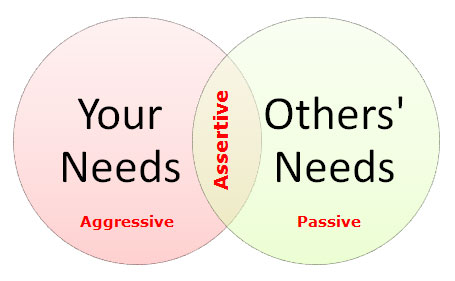
Ability to say no and not to say yes when you want to say no
Being assertive is defined as the ability to stand up for your own rights in a calm and positive way without being aggressive or submissive, accepting the wrong. There are many situations in our life that will want us to stand up for ourselves. Our duty to self should never be compromised for the happiness and satisfaction of others. We have to ensure that there arises no situation where we concede to others and later regret for our act. In today’s time , we would be crushed upon if we don’t stand up for ourselves.
Saying ‘No’ to someone is always considered to be rude behavior especially in our country. We feel that it is our duty to fulfill the requirements of our friends, relatives and any other acquaintances even if we have to forgo our comfort or routine. But this so called generosity and humility is laughed upon nowadays. It is high time we change our perception of helping others before helping ourselves.
When you take more care of others than yourself, you should not be called generous but foolish.
Indian culture and tradition were formed centuries ago when everyone was soft and straight minded. More than anything else, there was a sense of truth and virtue in their behavior. But, today the scenario has changed and people have no more time to ponder about the generosity and kindness we possess. All they care about is to get their work done as quickly and as easily possible. People have no time to appreciate our generosity but they all are ready to step on us and get their things done effortlessly. . So the most intelligent thing to do to survive in today’s world is to step out of the so called good shoes and take care of ourselves before we get into helping others.
One’s first duty is oneself
Love yourself and respect yourself is something that everyone keeps insisting on, but we should realize that it is one of our primary duty to take good care of ourselves. Nothing wrong should happen to us. We should always stand by our necessities and requirements before heading off to favour the people around us. It is not a justifiable act to put others needs before ours and in turn suffer because of it. This is not an act of selfishness but of good sense. We are not denying helping anyone in spite of being able to in a comfortable way but we just place our comfort and happiness first.
Assertiveness trains you how to say “No” diplomatically, without offending anyone.
The core idea of assertiveness is to say no to things you don’t support in a firm yet polite manner. Saying ‘No’ becomes a very tough thing only because it usually comes across as harsh and sharp. We have to learn the art of saying ‘No’ to things diplomatically and in such a manner that the other person feels that you are genuine in saying no. The entire process of opposing other’s views become simple. We should always remember to maintain a calm yet firm tone when we say ‘No’ to others. Thus, they don’t feel offended by it. But they should know that they cannot negotiate further on that issue. Similarly we should openly express the reasons behind our difficulties in helping them out as there is a high possibility that they would understand and the entire process becomes smooth. We offend a person only when we say things bluntly and on a sharp note. If we could just put the same thing in a diplomatic, polite manner and with a friendly touch then things will fall in place automatically.
Generosity should not befool us
There is only a thin line drawn between favoring someone and being fooled by them. We should make sure that we are generous enough for people to be happy about and not go around laughing at us. This is the reason we should always priorities ourselves first and then help others. If we go on helping others without caring about our wellbeing, then we will always be ladder on which others climb on to become successful. We should be in a situation where, we have nothing to lose if we help others and this will lead us to be intelligently generous.
It is essential for us to remember that overloaded generosity may add up in our book of good deeds but it certainly is not the formula for success in today’s highly competitive world.
Thanks for reading.
Courage to Continue Denotes Success

The word success as defined in the dictionary means “ the accomplishment of an aim or purpose” . True as it is but definition of the word success changes from person to person. Every individual’s definition of success is different. And why Not? We all have different aims, objectives, goals and purpose of life. And accomplishment of those would mean SUCCESS
to each one of us. Though there is no common definition of success many successful people have presented their views on success. Let us now understand what success meant to them and how best we can add to our success from their experiences.
A writer, statesman and a leader as he was Winston Churchill who has contributed immensely to the Britain’s victory in World War II has quoted that
“Success is not final, Failure is not fatal; It is the courage to continue that counts”. Isn’t it true? Many people think that if you fail at something , it is the end of your life. The suicidal stories you hear after the academic results are declared clearly indicate people’s
attitude towards failure. The quote mentioned above re instills the value of courage to continue the effort in spite of several failures. In short, perseverance is one of the keys to success.
When one wants to achieve something one should turn deaf ears to what people say about your endeavors . Because as the quote goes,” At first they will ask why you are doing it ;But later they will ask How did you do it?
Yes, this is especially important for the people who are torch bearers. Torch bearers are people who attempt to tread the less taken path and are the first ones to do so. When you are pursuing something different and novel, skeptic people always try to ask the validity of such pursuit. Well, if you are convinced about your effort and are ready to give in your hundred percent you will be successful at it. And then the same people would ask you the ways in which you tried to achieve such an untapped feat.
Life is a mix of good and bad times. We are successful sometimes and sometimes we do fail. The most important thing in life is to “Be thankful for hard times as they have made you.” Hard times are testing times. Failures should be visualized as a lesson. I t is rightly said,” When the going gets tough, the tough gets going”! Every struggle to get successful will make you wiser and stronger.
While achieving success it is important that you put your heart , mind and soul into excelling at what you have undertaken. If needed you have to sacrifice a lot in order to achieve something great. Swami Sivananda has rightly pinpointed the secret of success. He
quotes ,” Put your heart , soul and mind into even your smallest acts”. It is also very evident that there is no shortcut to success. It is well known that there is “No elevator to success. You have to take the stairs.” Hard work in proper direction definitely yields success. ease everybody.
Success is a result of focus, hard work, learning from failure , loyalty and persistence .Indeed when you strives to excel at certain thing you are bound to be successful. When you balance your hard work with persistence and loyalty the end result will be none other than SUCCESS.
Nelson Mandela quotes” Don’t judge me by success but how many times I fell down and got back again”. If you have persevering attitude in life, nothing can stop you from being successful. Perseverance is a factor which differentiates between success and failure.
Success is , thus, relative to each individual. Unfortunately, many people don’t have goals at any time in life. Life is very short and the most important thing in life to be successful is to set some goals. What is a life without goals? People misconstrue goals to be only related to career and finances.
Well, negating that opinion you can categorize goals as:
- Career goals,
- Financial goals,
- Health goals,
- Family goals and
- Goals for society
- Hobby Goals
- And Spiritual Goals
You have to take charge and set goals for yourself. The priority of goals would differ from person to person. You may feel family and health goals are more important than the rest of the goals. An ambitious person may prioritize on career and financial goals. Hobby goals are the goals which are meant for yourself satisfaction. Society plays an important role in everyone’s life. You should also set some goals which will benefit the society. It is a way to give back to the society where you belong.
Maslow’s pyramid of self motivation has the self actualization need at the top of it! Spiritual goals help achieve that need of a person.
While setting up goals make sure that your goals are SMART.
SMART Goals mean
S- Specific
M-Measurable
A-Achievable
R-Realistic
T-Time bound
Well, to achieve success be specific about what you want to achieve. The goals should have some yardstick against which you can measure your success. You should always have realistic goals and not unbelievable ones.
An example of setting a goal could be “ I want to reduce my weight by 1.5 kgs in a matter of 15 days. Once you do that you can start working over it by chalking out a plan and then executing the same.
Always check on what you have achieved against what you wanted to achieve And keep on bridging the gap, if any. When diligently persevered, success becomes a habit!!
Thanks for reading.
